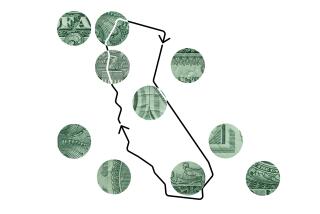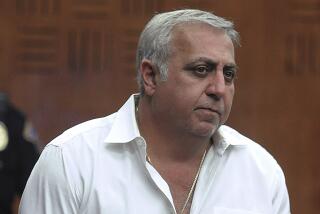Businessman Tells Squeeze by Montoya
- Share via
SACRAMENTO — Douglas O. Ruedlinger, head of a Florida insurance company, recalls he was pleasantly surprised one day in 1985 when he got a phone call out of the blue inviting him to meet California state Sen. Joseph B. Montoya.
The 50-year-old Ruedlinger says he flew on his corporate jet to Sacramento, where Montoya offered to back legislation opening the California market to Ruedlinger’s company, which specializes in catastrophic insurance for high school athletes.
But then, he said, the Whittier Democrat told him the catch: Ruedlinger would have to give the senator money if the bill was going to get through the Legislature. Later, former Montoya aide Kathleen Somerton told him the price would be $10,000 in speaking fees plus airline tickets to Florida, the businessman recalled Wednesday.
“He (Montoya) made it very clear to me there would be speaking fees and expenses,” Ruedlinger said in federal court. “I had every reason to believe this was part and parcel of what was necessary. . . . Without the fees, it (the bill) wasn’t going to go anywhere.”
Ruedlinger recounted his story of “legislation with a price tag” to the jury that will decide whether Montoya is innocent or guilty on 12 felony counts of extortion, bribery, racketeering and money laundering. Montoya, who was chairman of a Senate committee that dealt with sports issues, is accused of using his elected position to solicit money from individuals with a stake in legislation.
The insurance executive was the first witness in the 2-week-old trial to testify that Montoya directly asked for money in exchange for legislative action. So far, other witnesses have said Montoya made similar requests but was more subtle, asking for “support” rather than “speaking fees.”
About six months after Ruedlinger declined to pay Montoya, he told the jury, the senator retaliated by sending out a letter to high school principals throughout California criticizing the sports insurance then being offered by Ruedlinger’s company.
“This program was not and is not appropriate in terms of good public policy,” Montoya wrote.
After learning of Montoya’s letter to the principals, Ruedlinger wrote an angry response to Somerton but never mailed it. “I hope that those who are supplying him with some ‘speaking fees’ are getting their money’s worth,” he wrote in the letter introduced into evidence.
During cross-examination, defense attorney Michael Sands was unable to shake Ruedlinger’s account of events.
The businessman did not back down from his insistence that Montoya requested the payment of speaking fees and expenses in exchange for passage of the bill. And he testified that Somerton told him the speaking appearances were to be staged in Montoya’s district.
“You would pay $10,000 to the senator to speak in his own Senate district?” Sands asked in disbelief.
“That was the gist of it,” Ruedlinger replied.
Insurance for Athletes
At the time of his meeting with Montoya, Ruedlinger said his company, Douglas Ruedlinger Inc., sold catastrophic insurance for high school athletes in every state but California. It was the only company in the nation that sold policies providing lifetime benefits for the athletes.
The bill proposed by Montoya would have required every school district to buy the “lifetime” insurance, thus giving Ruedlinger’s company a virtual monopoly until other companies began offering the same kind of coverage.
His company could have grossed more than $1 million from sales in California with a profit of more than $50,000 under Montoya’s bill, he said.
Ruedlinger told the jury he had never been in touch with Montoya’s office until he received the first call from Somerton inviting him to come to California and meet the senator. He speculated that Montoya had heard of his company from reports in such publications as the Wall Street Journal and Sporting News.
Later in the day, former Assemblyman Alister McAlister gave a civics lesson to the jury.
Standing before a chart that shows how a bill becomes a law, McAlister explained, among other things, that “juice bill” is a term for legislation that is likely to bring substantial campaign donations from groups that support or oppose it.
It is like “people squeezing an orange and juice comes out of it,” said McAlister, now an insurance lobbyist who once ran for office calling himself “Honest McHonest.”
McAlister, testifying as an expert witness for the prosecution, said the Senate Business and Professions Committee, chaired by Montoya since 1983, is one of those that would be considered a “juice” committee because of the large number of “juice bills” that come before it.
More to Read
Sign up for Essential California
The most important California stories and recommendations in your inbox every morning.
You may occasionally receive promotional content from the Los Angeles Times.










